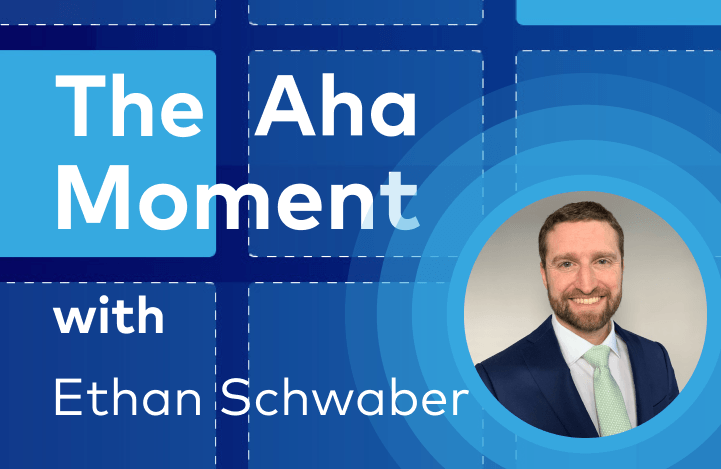The ‘Aha’ Moment: PM Influencer Series with Ethan Schwaber


In our series, The Aha Moment, we chat with influencers in the PM & PPM space and get to know them better. We ask a bunch of questions, some biz related and some not so biz related, in order to understand what makes them tick and find their aha moment.
This month’s feature is PMO Pro, Ethan Schwaber. Read on to discover his secret musical talent, and how a career in aerospace paved the way for Project Management success!
Professional Stuff….
Q. What is your job title and in which industry are you working in?
A. I am the Director, Project Management Office (PMO) for one of the largest dental service organizations (DSOs) in the United States.
Q. What is something unique that most people do nt know about you?
A. I’m a classically trained pianist since the age of 5, and can listen to most musical pieces and play them on the piano.
Q. What led you to this career?
A. Previously in my career, I worked in the aerospace industry for about 14 years with Boeing. I’ve always been a good planner and analyst. While working to support the 737 Program at Boeing, I learned about Lean, Six Sigma, and other process improvement methods. Before long, I was given opportunities to manage large and complex projects, utilizing Boeing’s mature project management processes. Soon, I became a Senior Program Manager fulfilling many roles, including the Work Statement Manager for the 737 MAX and the Risk Management Leader for the 737 Program, where I built up a new system to address previous flaws that became the gold standard at Boeing. I moved into formal management due to my love of working large-scale strategies and helping others. Post Boeing, I led a PMO where we reduced project costs significantly in under a year. In my current role, I am building an Enterprise PMO from the ground up.
Q. What is your biggest challenge in your profession? How do you overcome it?
A. My greatest challenge is convincing others in organizations about the importance of project management and PMOs, and to invest adequately in them. People fundamentally get what other departments do, such as Accounting, HR, or IT. But many people don’t truly understand what a PMO does. To overcome this challenge and get people supportive of PMOs, I try to have the right conversations with people at all levels. I provide trainings that help people understand what strong project management looks like, and the value that brings to an organization. I focus working projects with those leaders who are supportive, and build from a foundation of quick wins. For those who continue to be resistant and refuse to have PMO help with projects, sometimes you just have to give them an opportunity to fail. I have seen this happen throughout my career and usually at some point, the project starts having major issues. That is when those resistant come calling to PMO for help. Over time, strong PMO support can be built up.
Q. If you had a magic wand, what’s the one thing you would change about Gantt?
A. To go from seeing the critical path drawn down the waterfall-type chart to being presented in a straight-line view, where it is easy to see all the dependent tasks on the critical path. Critical paths are the magic behind controlling project schedules.
Q. Why should every organization have a PMO?
A. PMOs help make it easier for organizations to achieve their business goals and objectives. A strong PMO can also drive higher productivity and increase efficiency. A few fun facts around PMOs and project management: 1. The ROI on a good project manager is usually in the range of 5-10x, but can be higher. 2. 17% of IT projects that fail can bankrupt an entire organization. 3. Strong PMOs reduce project failure by over 60%. 4. Without strong project management, organizations waste about 10% of investment dollars. With strong project management, that waste can be reduced by about 90%. Smart organizations and leaders understand how critical PMOs are, and that they should be supported just like other essential departments.
Q. What’s the most difficult thing about managing stakeholder expectations?
A. Managing stakeholders with competing goals or interests. Trying to get people on the same page and be supportive–even when their personal interests may get in the way–can be quite challenging.
Q. What advice would you give to up-and-coming professionals like yourself?
A. Always strive to learn and don’t be afraid to fail. People often learn the most from failure. Project management is constantly evolving. There are new methods, approaches, and software applications introduced each year. Currently, using AI in project management is stirring a lot of interest. Learn as much as you can, and don’t limit yourself to just one area (i.e. just doing scrum-type software development projects).
Fun Stuff
Q. If you were the host of a late night talk show, who would invite as your first guest?
A. My wife, Kathleen Schwaber. She has been instrumental in my personal success and I have learned so many important life lessons from her.
Q. Which fictional place would you most like to live in?
A. A place where the media and government officials always told you the truth.
Q. If you had an unlimited supply of one thing what would it be?
A. Gratitude. It’s the key to happiness.
Q. What three items would you choose if stranded on a desert island?
A. My family, my piano, and a first aid kit.
Q. Who would you want to play you in a movie about your life?
A. Robert Downey Jr. He plays the piano and seems to have an analytical mind.
If you want to connect with Ethan and gain key insights from his expert ppm content, look him up on LinkedIn. Thank you Ethan for hanging out with us and answering our questions!